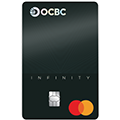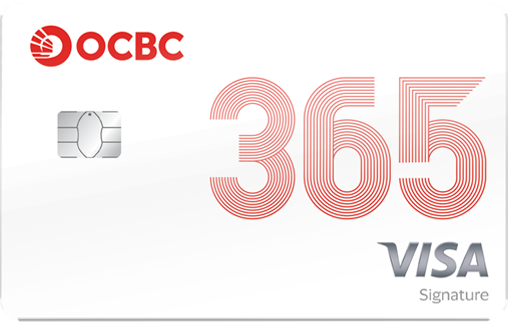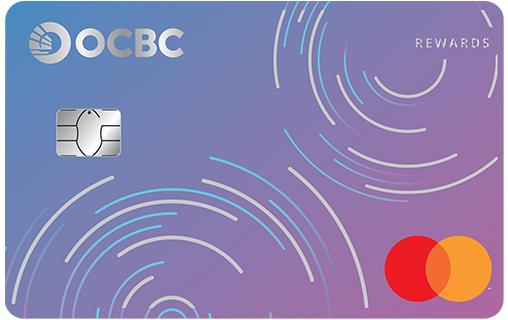Managing your personal finances while living overseas?
Managing your personal finances while living overseas?
Managing your personal finances while living overseas? A young Singaporean shares with us her challenges
This interview was conducted by DollarsAndSense as part of a content series with OCBC Life Goals – Imperfect Journeys. This series hopes to open-up honest conversations about the many uncertainties we all face in life, and the benefits of implementing well-grounded plans to overcome them. To understand how you can start planning for your own Life Goals, watch Gurmit Singh open up about the challenges he faced planning for time with his kids, career and retirement.
When we were younger, managing our money didn't go much beyond just making sure we spend within what our parents have given us.
When we finally receive our first pay cheque, we become responsible for managing the money we earn, and how we choose to spend it. This need to be responsible over our own finances is even more real if we are living overseas on our own, away from our family.
Cindy Teh, a Singaporean who is currently in her late 20s, is one such individual who knows what it's like living alone in a foreign country. After graduating from university in 2011, Cindy worked in Singapore for a year before deciding to embark on a new journey. She wanted to broaden her horizons and to experience living and working in a foreign country.
Moving (And Living) Overseas
In 2012, Cindy packed her bags and left for New Zealand (NZ). She chose NZ, as it offered her the opportunity to get a 6-month working holiday visa, which was applicable for Singaporeans who are under the age of 30. A few months after she arrived in NZ, Cindy found a full-time job and was able to get a work visa.
In total, she spent five years in NZ, six months in Australia and another six months in Europe. Cindy recently returned from Europe to Singapore for a short while and we were able to meet up with her for a short catch up session.

DollarsAndSense (DNS): Not many Singaporeans have lived overseas for an extended period of time, let alone for years. What prompted you to move to NZ in the first place?
Cindy Teh (CT): Since young, I've always wanted to live in another country besides Singapore, and meet new people, make new friends and explore new places. After working in Singapore for a year, I managed to save enough and was able to pursue this goal of mine!
DNS: You shared with us briefly (before this interview) that you were able to earn a little more in NZ, compared to your previous job in Singapore. One of the things that we noticed is that when it comes to living overseas, many Singaporeans underestimate the cost of living. How was that like for you? Were you able to save much?
CT: This is not something I'm particularly proud of but no, I didn't save a lot in NZ. There were many reasons for this – I was young and clueless about personal finance. I splurged a lot on expensive dinners and was frequently living from paycheque to paycheque. Most months, I would be down to my last dollar even before payday. It was basically a YOLO lifestyle, which I reasoned to myself, was okay, since I was literally living my dreams of travelling to a new country.
One of the things with living overseas on your own is that you incur a lot more expenses than you would in Singapore. For example, I needed to buy and maintain a car (gas, car insurance, servicing, repairs), pay rent, groceries (weirdly expensive in NZ) and my own personal health insurance. These costs add up. The tax was pretty high as well.
On hindsight, I really could and really should have saved much more.
Managing Money While Travelling
Managing our own finances while we are living in Singapore, a country that we are familiar with, isn't easy. For travelers like Cindy who are living alone in a foreign country, this is even more challenging.
DNS: Your journey has been very different from your peers. Most of them would have got a job after graduation, work for a few years, settle down, get married, buy a home and have kids. In comparison, how does yours look like?
CT: I got a job after graduation and worked for a few years, in Singapore and NZ. I guess that's where the similarities end!
I've moved around a lot more than most people my age. My life is fluid and nothing is set in stone (yet). I do however have plans to settle down in a couple of years, get married, have a home and kids.
DNS: With the travelling lifestyle that you have, what are some of the financial challenges that you face?
CT: Moving around means that I had less opportunities to save for the future, as the money that I save usually goes to flights, visas, currency conversions, transport, insurances (paying twice – for Singapore and the countries I live in).
Taxes are usually higher in other countries as well which impacts the amount I am able to save.
My career is also "less stable" as I'm always moving around, so I have to freelance whenever I don't have a "real" job. The freelance life is not for everyone, as you have to deal without job security or a fixed income.
Sometimes you are forced to accept lower–paid jobs because they are still better than not having any jobs. Whenever I travel between places, I also have to factor in transport expenses, be it flights or buses. Depending on the accommodation I have, I might not be able to cook, so my food costs go up.
If I don't have Wifi, then I won't be able to work, or I'll have to pay extra for Wifi. If I lose something important, or my passport/laptop gets stolen, that's additional expenses.
DNS: If you could travel back in time to advise your 22–year old self, what would it be?
CT: I will tell my younger self to learn to live within her means! Stop cabbing everywhere and going to a new restaurant every other day. You don't need those! I will also tell her to enforce the discipline of learning how to save, and to start investing earlier. This will make it easier for her to accomplish her dreams of travelling around the world.
DNS: If given a choice, which country would you hope to retire at?
CT: At the moment, I'll like to retire in NZ or Canada. Having lived in NZ, I know that it's going to be a great place to retire. But I've not lived long-term in Canada before. From the few visits I had, it seems like a nice place to retire at. In both countries, language is not an issue, the people are awesome and they are both relatively safe/stable countries which are close to nature.
DNS: We know you still want to travel, but are you worried about your long–term future such as your retirement?
CT: To be honest, I have never really thought about retirement. Right now, I think I will be pretty bored if I were to stop working. Personally, I would much rather prefer semi–retirement, where I only need to work a few days each week, and yet not have to worry about money.
Even though I haven't started planning, I am quite confident that I will be able to achieve my goals once I set my mind on it. I'm not done travelling (yet). But what travelling and living in different countries taught me about money is that anything is do–able, as long as you live within your means and manage your money wisely.
DNS: How do you intend to start investing?
CT: I have already done so! I started investing in Bitcoin in 2017. Basically, I started thinking I needed to invest and everyone was talking about Bitcoin so I took the plunge to get started. I admit, there was a little of FOMO (fear of missing out) that got into me.
Moving forward, I definitely have intention to start investing as I think it's important for me to build up passive income streams if I want to continue travelling, or to live my life in the way that I prefer.
I'm quite optimistic about the future. Even if I want to settle down, have kids, I'll want to work less and spend more time with them. So, I am hoping to build up different sources of passive income streams over the next few years. But I know I need to start off by first building up my investing knowledge.
This interview was conducted by DollarsAndSense. All information shared by the interviewees are their personal thoughts and do not necessarily represent the views of DollarsAndSense or OCBC.
Sweet bird of youth

By Tan Siew Lee,
Head,
Wealth Management Singapore
OCBC Bank
Oh what it means to be young! The verve and vivacity of youth meeting the seemingly limitless promise of a big, big world. Enjoy life; experience the world, for you only live once. The sage advice of people looking to rationalise the financial appropriateness of any exorbitant purchase, be it another luxurious getaway or an expensive garment. After all, what's life if you don't live it fully and on your own financial terms.
But what's life without perspective. It's perfectly alright to choose to live pay cheque to pay cheque. It's your life; your prerogative. Yet, you must also be willing to accept the consequences of those choices. Sure, we only live once, but - save for some unforeseen ailments or accidents – that tends to be a very long one. And over the long-term, life may prove to be a brutal beast for those who are ill-prepared.
Saving for a rainy day
Indeed, the temptation for near-term gratification is enormous, as Ms Cindy Teh can attest to during her travels. Financial prudence and judiciousness tend to fall by the wayside when you're living in the moment day by day. And soon you find your finances stretched, anticipating that next pay cheque so that you can repeat the cycle all over again. Living within your means is an age-old advice that seems so obvious to some, yet profoundly difficult to put into practice for many.
Taking a long-term perspective on your finances is crucial to ensure the longevity of your resources. Young people tend to postpone the need to make these long-term financial plans because they think time is on their side. But time itself is a currency that you pay in exchange for your comfortable life today. The longer you postpone saving and investing, the larger the amount of future income you forego as compounding is delayed. After all, compounding requires time to be effective, a lot of it.
Planning for the future can simply start by budgeting one's income every month. Like food, it's all about portion control – apportioning part of your funds for savings and the remainder for spending. But budgeting in itself is useless if you lack the discipline to follow through with the plans, simple as they may be. If discipline is the issue, then automating the savings decision through a regular savings plan that immediately ring fences a portion of one's income every month can be particularly useful.
Invest with a goal in mind
Ideally, one should have about 6 to 8 month's worth of income as emergency funds. The remainder should be invested, and the type of investment to make would largely hinge on the purpose of that investment. For instance, within the savings bucket, one could apportion part of it for long-term savings that could go toward financing retirement goals and another to finance short-term splurges like travelling and the like. And so, the type of investment product to allocate savings makes a material difference.
Endowment plans which have an extended lock up period can help ring fence savings for longer term goals. You can only terminate the policy at substantial penalties and costs to yourself, putting the funds safely away from your reach for a long, long time whilst it grows at a typically conservative rate.
On the other hand, investments in unit trust and exchange-traded funds can be liquidated with ease, whilst also helping you grow your funds at a higher rate of return than typical deposit rates.
On a more broader level, individuals should approach investing with the right frame of mind. It's good that Ms Teh has had a taste of investing her funds in an asset like Bitcoin. While her experience has been positive so far, we would caution her against investing too much of her savings in such speculative assets particularly because it is highly volatile and susceptible to large swings in prices. The fear of missing out, as Ms Teh mentioned in her interview, should not dictate or influence our investment decisions. Rather, it is the fundamentals of the asset, the balance between risk and return and the investment horizon that rightly should. It does not mean avoiding such new asset classes altogether. Instead, it's about assessing how such an asset fits within the context of your portfolio.
Ms Teh should first consider constructing a diversified portfolio of investments that is spread across multiple asset classes, regional exposures and investment strategies. A portion of her investment portfolio can then be allocated toward such short-term tactical investments in Bitcoin and other speculative instruments, as is appropriate for her tolerance for risk and as is sensible to the longer-term risk-adjusted returns of her portfolio. Sure, some securities could can offer huge and attractive returns, but it also introduces a great deal of risk to one's portfolio. As such, risk taking should be considered in the context of a diversified portfolio, as opposed to just taking concentrated bets on any one security or asset.
With this in mind and the help of a good financial advisor, Ms Teh can then start exploring potential investments that can provide a reliable source of passive income which she may want to accumulate over the long term.
Thinking about retirement
On the bigger questions of life goals, Ms Teh has a clear idea of what retirement means to her. She would still like to work but not be slaved to the job for financial reasons. Working a few days a week to occupy some of her time whilst mostly indulging her interests including travelling and spending time with her family constitute an ideal retirement to her.
True financial independence at retirement requires planning. Sure, living within one's means is always good advice, but it need not always take into consideration the costs of the unforeseen. Planning for the "what ifs" is crucial given the sheer unpredictability of life, especially in relation to health. Indeed, age inevitably comes with health issues. An active lifestyle may reduce the risk of ailments, but it does not eradicate the risk altogether. It is something one should anticipate and plan for while healthy. Treatment for sudden illnesses coupled with escalating healthcare costs can become huge financial burdens later, potentially impinging on one's retirement.
One way to begin planning for such contingencies, is to regularly review your insurance coverage to ensure that it is sufficient to cover any financial risk posed by unforeseen illnesses and/or accidents. It may seem trivial to some, but insurance coverage plays a paramount role in one's financial planning.
Ultimately, having a comprehensive retirement plan in place is useful to provide a peace of mind so that you can pursue your passions without worrying too much about the unexpected. Just as with compounding, early planning help decrease the possibility for ugly surprises later in life.
The journey matters, as much as the destination
Financial planning to meet your life goals is just as much about the journey as it is about that final figure you would like to see in your bank accounts. Circumstances change with time and with it the goal posts. The composition of your investment portfolio and the size of insurance coverage should change as the targets move. Regularly monitoring and revisiting these plans in order to take stock of your financial progress is important to make sure that your targets are realistic and that you are on track to meet your financial goals.
At OCBC Bank, we are here to help our customers on this journey for the long term. We believe in conducting annual reviews with customers to ensure they remain on track to achieving their goals.
The views expressed above are the opinions of Tan Siew Lee and do not necessarily represent the opinions of DollarsAndSense or the interviewees.
The information provided herein is for general information only. It does not take into account the specific investment objectives, financial situation or particular needs of any particular person, and does not constitute an offer or solicitation by OCBC Bank to provide loan or financing to any particular person or to enter into a transaction.
No representation or warranty whatsoever in respect of any information provided herein is given by OCBC Bank. All information presented is subject to change without notice. OCBC Bank shall not be responsible or liable for any loss or damage whatsoever arising directly or indirectly howsoever in connection with or as a result of any person acting on any information provided herein. Any reference to any specific entity, authority, area, figures, property or asset class in whatever way is used for illustrative purposes only and does not constitute a recommendation on the same.
The contents of this article are considered proprietary information and may not be reproduced or disseminated in whole or in part without OCBC Bank’s written consent.









